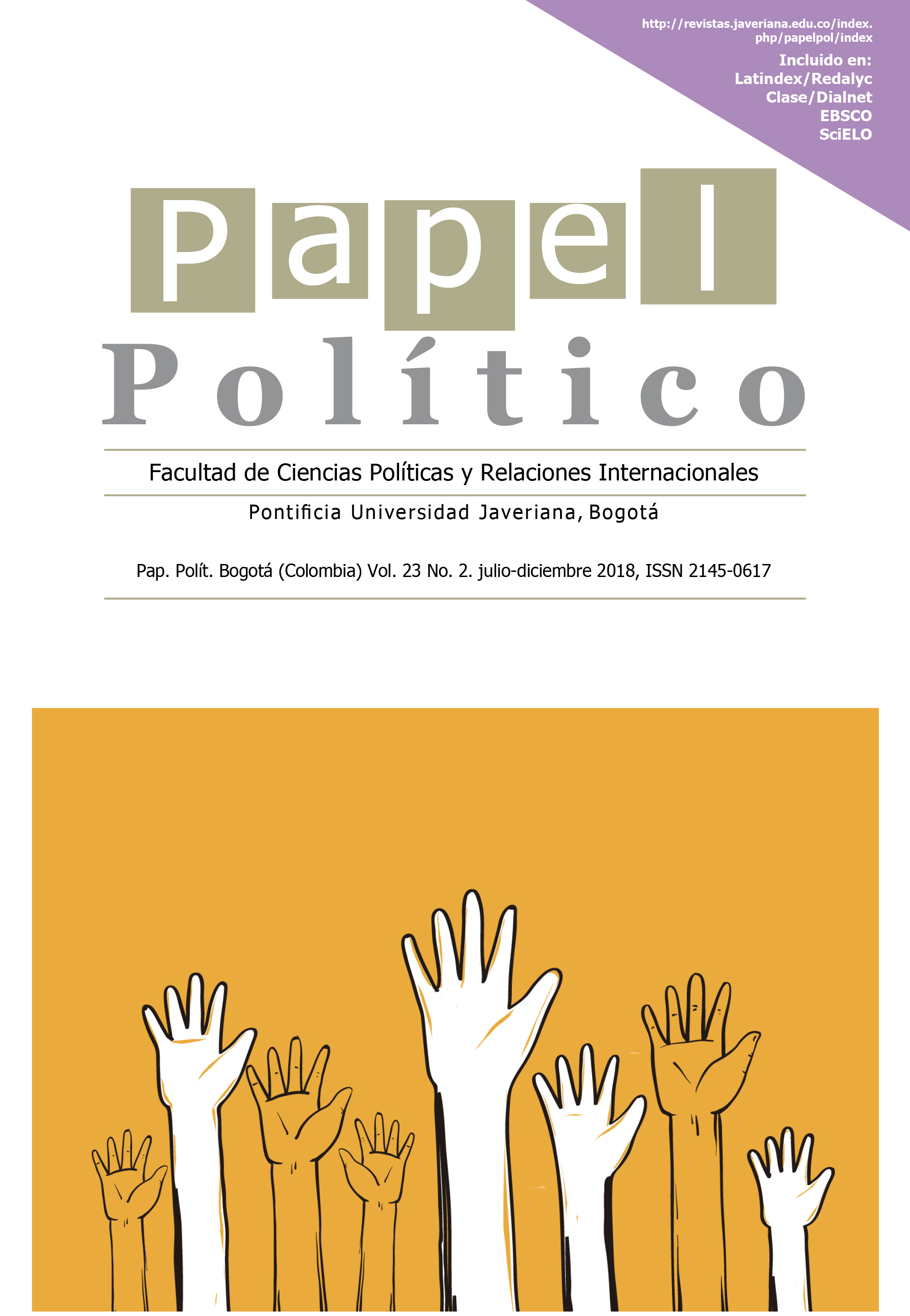Abstract
This article examines, under the neoclassical realism, those systemic and domestic factors influencing some of the milestones in the USA foreign policy regarding the Middle East by the end of the Cold War. In the first part herein, we study the early interactions during the 18th century. Next, we observe the events from the 20th century first half to the end of the Cold War, when strong changes took place in the political elite thinking of the United States regarding the Middle East. Finally, we focus on Saddam Hussein’s reaction that eventually led to the Gulf War in 1990, and then we draw some conclusions.
Ali, Mohamed, John Blacker, y Gareth Jones. "Annual Mortality Rates and Excess Deaths of Children under Five in Iraq, 1991-98". Population Studies 57, no. 2 (July 2003): 217-226.
Aranda, Gilberto, y Morandé. José. "Hegemonia Norteamericana en Medio Oriente. Algunas premisas". Revista de Estudios Árabes, no. 1 (2005): 9-30.
Badeau, John. The American Approach to the Arab World. New York: Harper and Row, 1968.
Baghdad Domestic Service. "Saddam´s Hussein Initiative". 12 de agosto de 1990.
Balmaceda, Leonardo, Pedro Brieger, y Carmen Sfrégola. "Estados Unidos y la contención dual." Ponencia presentada en III Jornadas de Medio Oriente. IRI (UNLP), La Plata, 2000.
Barbé, Esther. "Orden Internacional: ¿Uno o varios? Neoimperialismo, Caos y Posmodernidad". En Cursos de Derecho Internacional y Relaciones Internacionales de Vitoria-Gasteiz 2004, 155-190. Bilbao: Servicio Editorial de la Universidad del País Vasco, 2005.
Bosemberg, Luís E. "Estados Unidos y el Medio Oriente: moderación, rivalidad y hegemonía". Historia Crítica, no. 26 (2003): 9-23.
Claire, Rodger W. Raid on the Sun: Inside Israel’s Secret Campaign That Denied Saddam the Bomb. New York: Broadway Books, 2004.
Chomsky, Noam. "Los dilemas de la dominación". En Nueva Hegemonía Mundial, editado por Atilio Borón. 3-14. Buenos Aires CLACSO, 2004.
Drezner, D. W. "The New New World Order". Foreign Affairs 86, no. 2 (2007): 34-46.
Fukuyama, Francis. "The end of history?". The National Interest 16, no. 4 (1989): 3-18.
Gaddis, John Lewis. The Cold War: A New History. New York: Penguin Group, 2007.
Halliday, F. The Middle East in International Relations. New York: Cambridge University Press, 2005.
Herrmann, Richard K. "The Middle East and the New World Order: Rethinking U.S. Political Strategy after the Gulf War". International Security 16, no. 2 (1991): 42-75.
Ismael, Tareq. International Relations of the Contemporary Middle East. A Study in World Politics. New York: Syracuse University Press, 1986.
Khalidi, Rashid. La reafirmación del Imperio: Estados Unidos y la aventura occidental en Oriente Próximo. Madrid: Catarata, 2004.
Krauthammer, Charles. "The unipolar moment". Foreign Affairs 70, no. 1 (1990): 23-33.
Krauthammer, Charles. "The unipolar moment revisited". The National Interest, no. 70 (2002): 5-18.
Kupchan, Charles A. The Persian Gulf and the West: The Dilemmas of Security. Boston: Allen and Unwin, 1987.
Mearsheimer, John, y Stephen Walt. El Lobby d'Israel. Badalona: Ara, 2007.
Mueller, John, y Karl Mueller. "Sanctions of Mass Destruction". Foreign Affairs 78, no. 3 (1999): 43-53.
Nye, Joseph S. "What New World Order?". Foreign Affairs 71, no. 2 (1991): 83-96.
Raas, Whitney, y Austin Long. "Osirak Redux? Assessing Israeli Capabilities to Destroy Iranian Nuclear Facilities". International Security 31, no. 4 (2007): 7-33.
Slaughter, Anne Marie. "The Real New World Order". Foreign Affairs 76, no. 5 (1997): 183-197.
Vereté, Mayir. "The Balfour Declaration and its Makers". Middle Eastern Studies 6, no. 1 (1970): 48-76.
Walt, Stephen. The Origins of Alliances. New York: Cornell U.P., 1987.
Woods, Kevin, J. Lacey, y W. Murray. "El engaño de Hussein visto desde adentro". Foreign Affairs en español 6, no. 3 (2006): 19-45.
This journal is registered under a Creative Commons Attribution 4.0 International Public License. Thus, this work may be reproduced, distributed, and publicly shared in digital format, as long as the names of the authors and Pontificia Universidad Javeriana are acknowledged. Others are allowed to quote, adapt, transform, auto-archive, republish, and create based on this material, for any purpose (even commercial ones), provided the authorship is duly acknowledged, a link to the original work is provided, and it is specified if changes have been made. Pontificia Universidad Javeriana does not hold the rights of published works and the authors are solely responsible for the contents of their works; they keep the moral, intellectual, privacy, and publicity rights.
Approving the intervention of the work (review, copy-editing, translation, layout) and the following outreach, are granted through an use license and not through an assignment of rights. This means the journal and Pontificia Universidad Javeriana cannot be held responsible for any ethical malpractice by the authors. As a consequence of the protection granted by the use license, the journal is not required to publish recantations or modify information already published, unless the errata stems from the editorial management process. Publishing contents in this journal does not generate royalties for contributors.



